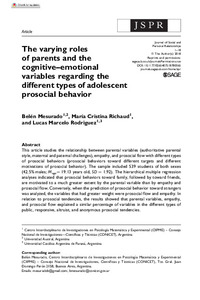Por favor, use este identificador para citar o enlazar este ítem:
https://repositorio.uca.edu.ar/handle/123456789/8622| Campo DC | Valor | Lengua/Idioma |
|---|---|---|
| dc.contributor.author | Mesurado, Belén | es |
| dc.contributor.author | Richaud, María Cristina | es |
| dc.contributor.author | Rodríguez, Lucas Marcelo | es |
| dc.date.accessioned | 2019-08-22T19:32:39Z | - |
| dc.date.available | 2019-08-22T19:32:39Z | - |
| dc.date.issued | 2018 | - |
| dc.identifier.citation | Mesurado, B., Richaud, M. C., & Rodriguez, L. M. (2018). The varying roles of parents and the cognitive–emotional variables regarding the different types of adolescent prosocial behavior [en línea]. Journal of Social and Personal Relationships, 36(7), 2116-2133. doi:10.1177/0265407518780365 Disponible en: https://repositorio.uca.edu.ar/handle/123456789/8622 | es |
| dc.identifier.issn | 0265-4075 (print) | - |
| dc.identifier.issn | 1460-3608 (online) | - |
| dc.identifier.uri | https://repositorio.uca.edu.ar/handle/123456789/8622 | - |
| dc.description.abstract | Abstract: This article studies the relationship between parental variables (authoritative parental style, maternal and paternal challenges), empathy, and prosocial flow with different types of prosocial behaviors (prosocial behaviors toward different targets and different motivations of prosocial behavior). The sample included 539 students of both sexes (42.5% males; Mage¼ 19.13 years old, SD ¼ 1.92). The hierarchical multiple regression analyses indicated that prosocial behaviors toward family, followed by toward friends, are motivated to a much greater extent by the parental variable than by empathy and prosocial flow. Conversely, when the prediction of prosocial behavior toward strangers was analyzed, the variables that had greater weight were prosocial flow and empathy. In relation to prosocial tendencies, the results showed that parental variables, empathy, and prosocial flow explained a similar percentage of variables in the different types of public, responsive, altruist, and anonymous prosocial tendencies. | es |
| dc.format | application/pdf | - |
| dc.language.iso | eng | es |
| dc.publisher | SAGE Publications | es |
| dc.rights | Acceso Abierto | * |
| dc.rights.uri | http://creativecommons.org/licenses/by-nc-sa/4.0/ | * |
| dc.source | Journal of Social and Personal Relationships, 36(7), 2018 | es |
| dc.subject | RELACIONES PADRES-HIJOS | es |
| dc.subject | EMPATIA | es |
| dc.subject | CONDUCTA SOCIAL | es |
| dc.subject | RELACIONES FAMILIARES | es |
| dc.title | The varying roles of parents and the cognitive–emotional variables regarding the different types of adolescent prosocial behavior | es |
| dc.type | Artículo | es |
| dc.identifier.doi | 10.1177/0265407518780365 | - |
| uca.disciplina | PSICOLOGIA | - |
| uca.issnrd | 1 | es |
| uca.affiliation | Fil: Mesurado, Belén. Consejo Nacional de Investigaciones Científicas y Técnicas. Centro Interdisciplinario de Investigaciones en Psicología Matemática y Experimental; Argentina | es |
| uca.affiliation | Fil: Mesurado, Belén. Universidad Austral; Argentina | es |
| uca.affiliation | Fil: Richaud, María Cristina. Consejo Nacional de Investigaciones Científicas y Técnicas. Centro Interdisciplinario de Investigaciones en Psicologıía Matemática y Experimental; Argentina | es |
| uca.affiliation | Fil: Rodríguez, Lucas Marcelo. Consejo Nacional de Investigaciones Científicas y Técnicas. Centro Interdisciplinario de Investigaciones en Psicología Matemática y Experimental; Argentina | es |
| uca.affiliation | Fil: Rodríguez, Lucas Marcelo. Universidad Católica Argentina. Facultad Teresa de Ávila; Argentina | es |
| uca.version | acceptedVersion | es |
| item.fulltext | With Fulltext | - |
| item.languageiso639-1 | en | - |
| item.grantfulltext | open | - |
| crisitem.author.dept | Facultad "Teresa de Ávila" (Paraná) | - |
| crisitem.author.dept | Departamento de Humanidades (Sede Paraná) | - |
| crisitem.author.dept | Centro de Investigación Interdisciplinar en Valores, Integración y Desarrollo Social | - |
| crisitem.author.dept | Consejo Nacional de Investigaciones Científicas y Técnicas | - |
| crisitem.author.orcid | 0000-0001-5525-1155 | - |
| crisitem.author.parentorg | Pontificia Universidad Católica Argentina | - |
| crisitem.author.parentorg | Facultad "Teresa de Ávila" (Paraná) | - |
| crisitem.author.parentorg | Facultad "Teresa de Ávila" (Paraná) | - |
| Aparece en las colecciones: | Artículos | |
Ficheros en este ítem:
| Fichero | Descripción | Tamaño | Formato | |
|---|---|---|---|---|
| varying-roles-parents-cognitive-emotional.pdf | 194,16 kB | Adobe PDF |  Visualizar/Abrir |
Visualizaciones de página(s)
170
comprobado en 30-abr-2024
Descarga(s)
622
comprobado en 30-abr-2024
Google ScholarTM
Ver en Google Scholar
Altmetric
Altmetric
Este ítem está sujeto a una Licencia Creative Commons

